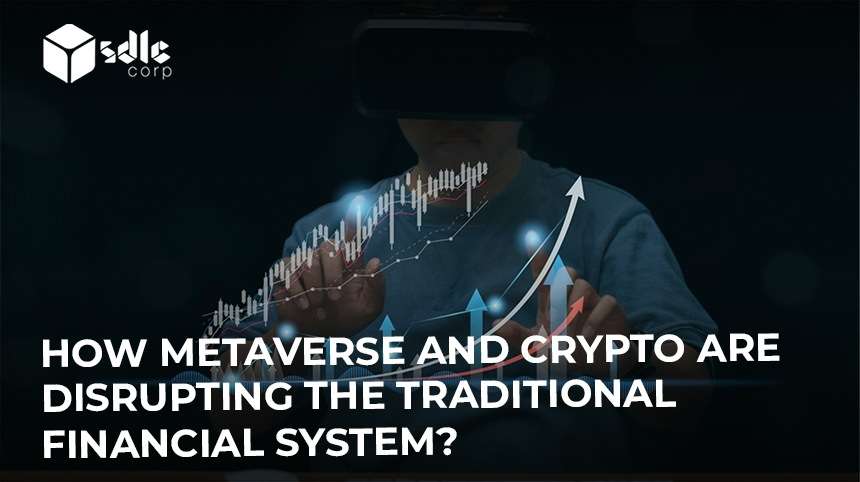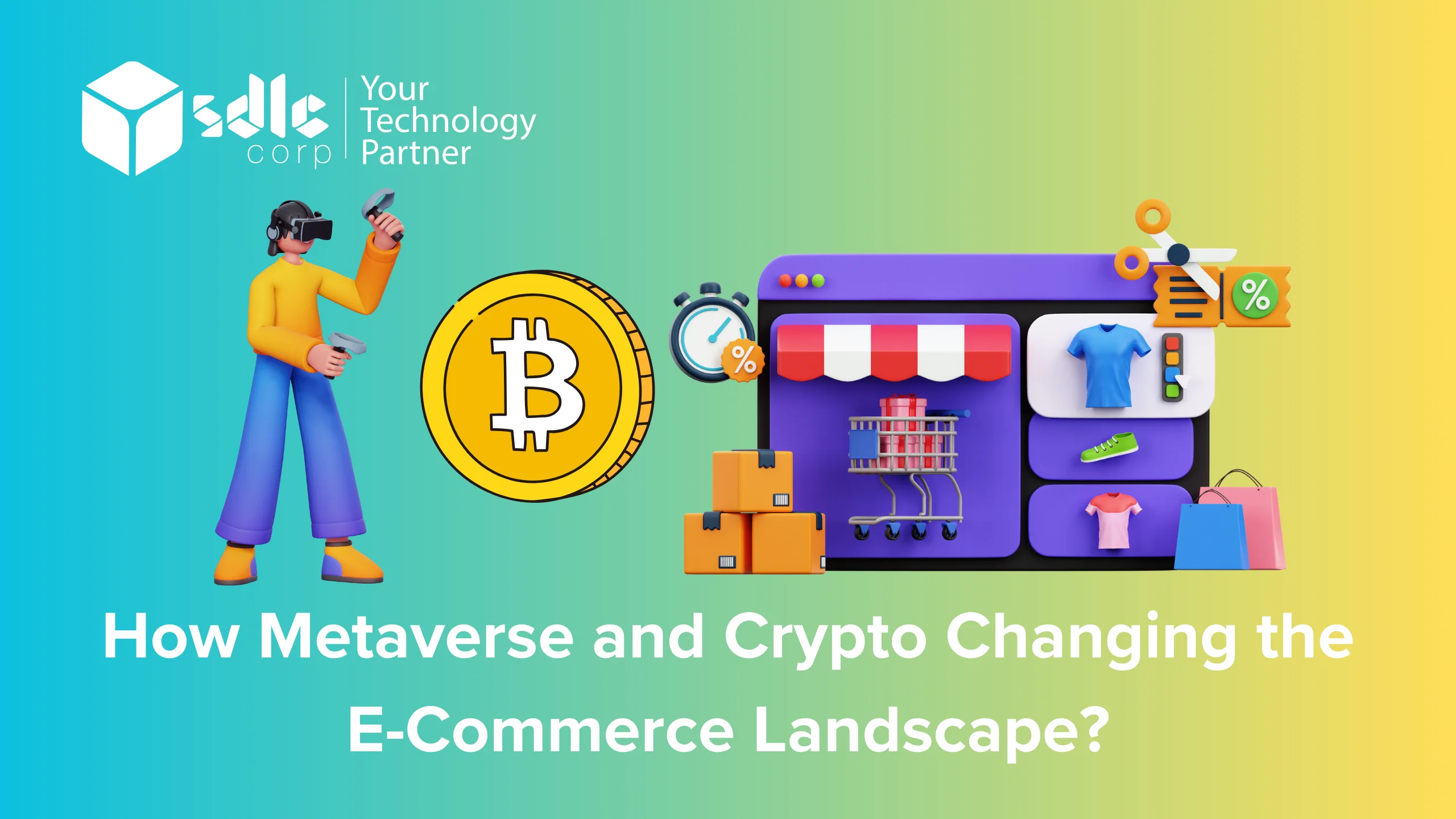The last several years have seen a tremendous increase in online shopping, due to a major contribution of the internet. The overall number of digital shoppers globally increased by over one billion between 2014 and 2021, and this growth is anticipated to continue, according to Statista. Our lives are now simpler than ever because of the successful entry into the digital age, where technology is growing and replacing old processes.
Blockchain, NFTs, virtual reality, and virtual money are recent technical breakthroughs that anticipate a more immersive online experience—the so-called “metaverse.” When we enter the world of web 3.0, metaverse is just around the corner. This article focuses on the Metaverse and Crypto in E-Commerce and how it affects the online retail industry, things that every owner of an eCommerce company should be aware of.
What is Metaverse and Crypto?
With the use of blockchain technology to build decentralised virtual worlds and economies, the Metaverse and cryptocurrency are becoming more and more entwined. In Metaverse , cryptocurrency may be used as a means of payment as well as to buy virtual goods.
Blockchain-based decentralized finance (DeFi) apps are being developed for use in Metaverse environments, enabling users to trade, lend, and borrow cryptocurrencies and other digital assets. Through the combination of the Metaverse and cryptocurrencies, users can create and sell their own virtual goods and experiences, such as virtual real estate, clothing, and entertainment. As both technologies are still in their early stages, it’s intriguing to see how they will shape society in the years to come. Investing in Cryptocurrency Development can help businesses capitalize on these emerging opportunities and integrate seamlessly into the evolving digital landscape.

Advantages of Metaverse and Cryptocurrency in Ecommerce
Decentralization
Decentralized technologies like the Metaverse and cryptocurrency do away with the necessity for middlemen. The procedure will be quicker, less expensive, and more secure if transactions can be made directly between the buyer and seller.
Example: Shopify
In December 2021, Shopify said that it was going to look into how NFTs and metaverse experiences could be used to give merchants and shoppers new options. The company is working on integrating its e-commerce platform with blockchain technology. This would let merchants sell directly to customers without middlemen and allow the creation of decentralised marketplaces.
Wide Reach
Bitcoin and the Metaverse have a global reach that allows e-commerce enterprises to connect with clients worldwide, breaking down physical barriers. This opens up opportunities for businesses to expand their customer base and increase revenue. Additionally, the integration of Metaverse NFT Game Development can further engage users by creating immersive experiences that attract a diverse, global audience and drive growth in the digital economy.
Explore our other insights!

Impact of the Metaverse and Crypto on Global Economy
Impact of the Metaverse and Crypto on Global Economy Businesses, economists, and IT enthusiasts are all paying attention

How Metaverse and Crypto are Revolutionizing the Traditional Financial System?
Introduction Metaverse and Crypto: Business Models, Digital Assets, and Financial Systems in the New Reality.The old financial system

Understanding the Intersection of Metaverse and Crypto with Artificial Intelligence
Metaverse and Crypto with Artificial Intelligence: At the point where the metaverse, cryptography, and artificial intelligence all meet,is
Example: Utrust
Utrust is a payment platform that is built on blockchain technology and enables enterprises to receive cryptocurrencies as a form of payment. The platform also features a digital wallet and an exchange service that enables users to transform their cryptocurrency holdings into traditional currencies, thereby simplifying the process of conducting transactions across international borders.
Security
Blockchain technology, on which cryptocurrencies are built, offers a high level of security. A decentralised ledger is used to verify and record transactions, making it challenging for hackers to control the network. A further degree of protection is offered by the virtual system of the Metaverse, where transactions can be made in complete secrecy.
Example: OpenBazaar
OpenBazaar is a decentralised e-commerce platform that enables buyers and vendors to perform interactions directly with one another without the involvement of any intermediaries. Transactions on the platform are conducted using a cryptocurrency known as Bitcoin Cash, and the platform includes features for ensuring the safety of transactions, such as escrow and conflict settlement.
Transparency
Transparency is ensured via the use of blockchain technology in cryptocurrencies and the Metaverse, which records all transactions in a decentralised ledger and makes them transparent. eIt is now simpler to track and trace transactions due to this entire insight into the transaction history.
Reduced Transaction Fees
Compared to typical e-commerce platforms, transaction fees are much cheaper because there are no middlemen. This lowers the cost of doing transactions for businesses, especially small and medium-sized firms (SMEs).
Smart Contract
The conditions of the agreement between the buyer and seller are directly encoded into lines of code in smart contracts, which are self-executing contracts that may be created in the Metaverse. As a result, there is no longer a need for middlemen and transactions may be completed more quickly.
Faster Transactions
As compared to more conventional payment methods like credit/debit cards or bank transfers, transactions made using cryptocurrency are carried out more quickly. As there are no middlemen, transactions may be finished quickly, improving consumer satisfaction and lowering the possibility of fraud.
Rewards and Loyalty Programs
By providing rewards and loyalty programmes, e-commerce enterprises may use cryptocurrencies to entice customers. Customers become more loyal as a result, leading to increased purchases.
NFTs
Unique digital assets that are stored on the blockchain are known as non-fungible tokens (NFTs). They may be employed by online stores to produce uncommon and distinctive goods that can fetch a high price.
Impact of Metaverse and Crypto on Ecommerce
Decentralized Marketplaces
The emergence of decentralised marketplaces is one of the most important effects of cryptocurrencies on e-commerce. By enabling peer-to-peer transactions without the need of middlemen, these markets lower fees and transaction costs.
Increased Security
A reduction in the risk of fraud and refunds is possible when using cryptocurrencies in e-commerce transactions. Transactions may be verified and documented in a tamper-proof way by utilising blockchain technology.
Integration of the Metaverse
As the metaverse expands, e-commerce businesses may take advantage of it to provide new purchasing experiences. Users may easily acquire virtual products and services within the metaverse by incorporating bitcoin payments.
Asset Tokenization
Physical assets may be readily traded on decentralised markets by being tokenized using cryptocurrency. This may create new options for e-commerce businesses to offer goods like real estate or artwork that were previously challenging to sell online.
Smart Contracts
These self-executing contracts are created by writing the terms of the contract between the buyer and seller straight into lines of code. Smart contracts enable the autonomous execution of cryptocurrency transactions, eliminating the need for middlemen and accelerating the transaction process.
Cross-border Transactions
By eliminating the need for currency translations and international wire transfers, cryptocurrencies can make cross-border transactions simpler. This may make it easier for e-commerce businesses to access global marketplaces.
Loyalty Programs
Cryptocurrency can be used to create loyalty programmes that encourage customers to make purchases. E-commerce businesses may boost client retention and encourage repeat business by offering bitcoin rewards to their consumers.
Enhanced Transparency
Blockchain technology enables a transparent, auditable record of every transaction, which increases trust and openness in online transactions, thereby reducing the risk of fraud. Incorporating Blockchain Development into business processes can further enhance security and reliability, making digital interactions safer and more trustworthy.
Micropayments
Micropayments are possible with cryptocurrency, which is advantageous for e-commerce businesses that offer inexpensive goods. This can lessen the impact ofhow much minor transactions are affected by payment processing fees.
New Business Models
The metaverse and cryptocurrencies can help e-commerce businesses adopt new business models. For instance, businesses may design virtual stores within the metaverse that let customers explore and buy virtual goods in a 3D setting.
How to use Metaverse and Crypto together in E-commerce
Accepting Cryptocurrency Payments
One simple approach to incorporate cryptocurrencies into your business is to accept cryptocurrency payments in your online store. It enables your consumers to make payments using well-known cryptocurrencies like Bitcoin, Ethereum, and Litecoin and exposes your company to a new group of cryptocurrency users.
NFT Marketplace
Establish a market place in your Metaverse store for Non-Fungible Tokens (NFTs). NFTs, which are distinctive digital assets that can be purchased and traded, are gaining popularity in the e-commerce industry. Creating a market place for NFTs may be a terrific approach to draw in new clients and increase earnings.
Virtual Product Demos
Host virtual product demonstrations in your Metaverse store. Customers may experience things virtually through virtual product demos, which makes it simpler for them to make wise purchase decisions.

Example: FlipKart
E-commerce platform Flipkart has launched Flipverse, a metaverse shopping experience for android users. Flipkart has tied up with several brands for this web3 shopping experience. Shoppers can buy shoes and other sportswear from Puma, wearables from Noise, beauty products from Nivea, bags from Lavie, and even two-wheelers from TVS. The Flipverse from Flipkart functions in the Web3. Now, Web2 is the web version that most of us access. Decentralization, blockchain technology, and token-based economies are some of the ideas included in Web3.
You would have a customisable avatar and exist as a digital twin on Flipverse. It is possible to completely change the appearance of your avatar or to completely modify it so that it resembles you. When you use the Flipkart metaverse platform Flipverse, you will hear this word a lot. Digital collectibles in Flipverse would be NFTs. They can come in different forms, like Strand and other digital items.In Flipverse, a Strand is an NFT that you can claim to make your digital avatar and make Flipverse your “own virtual world.” Flipkart was also giving away up to 500 Supercoins to people who finished their KYC on Firedrops. The Flipkart app now has a new feature called “Firedrops by Flipkart.” You can get your own wallet through Firedrops by Flipkart, which is important for storing, trading, and collecting NFTs.
Augmented Reality (AR) Try-Ons
Employ augmented reality (AR) technology to provide customers the option to virtually try on things. Customers may have a more immersive buying experience with AR try-ons since they can be utilised for a variety of items, including apparel and home decor.
Example: LensKart
The LensKart app has 3D AI technology that enables users to digitally try on several frames and choose which one best suits them. Customers no longer need to visit physical stores due to any inconvenience. From the comfort of their couch, they may select the appropriate frame. The mobile vision correction technology offered by Lenskart is another distinctive offering. Customers can do an eye checkup at home. It makes sense that the app has received over 20 million downloads.Technology and AI are the biggest enablers in what we do and want to achieve . Our goal is to consistently raise the standard for customer service while surprising our clients. The items are created and tailored centrally in an amazing robotic center, guaranteeing the highest level of accuracy in the glasses without ever compromising on quality.
Taking one step further, Lenskart cleverly marketed their augmented reality throughout the IPL season. In less than 10 seconds, the virtual augmented reality creates a customised selection of glasses for the consumer based on face traits detected by AI. Discover more than 10,000 styles, virtually try them on, and even share them with others for a second view. This promotion, which included a free eyeglasses giveaway for clients every minute, was a smashing success. “We are thrilled to have an incredible reaction for Nazar Ghati Durghatna Ghati 2.0 highlighting Lenskart’s new feature of Augmented Reality,” stated Ramneek Khurana, Product Head at Lenskart.
Today’s visitors to the Lenskart App have already begun using the virtual augmented reality function. In the past two weeks, the firm has seen a 3X increase in the use of augmented reality. With the use of this new AR technology, Lenskart has enhanced its 3-D Try-On function, making it much simpler and easier to use to try on glasses online.
Virtual Events
Organize digital gatherings in your Metaverse shop. For example, sales events and product introductions may both be held virtually. They provide customers a special and interesting method to engage with your brand.
Loyalty Programs
Employ cryptocurrency-based loyalty programmes in your online store. Customers can earn incentives through cryptocurrency-based loyalty programmes that can be exchanged for other goods and services or bitcoin.

Centralized Alternative Markets
Build one in your Metaverse store. Decentralized marketplaces provide direct communication between buyers and sellers, eliminating the need for middlemen like Amazon or eBay. Customers may have more influence over their purchases as a result, which can lower transaction fees.
Crypto-backed Loans
Provide consumers with loans secured by cryptocurrencies. Loans that are backed by cryptocurrencies are known as crypto-backed loans. Customers may find them to be a wonderful alternative to selling their crypto assets in order to obtain funds.
Smart Contracts
Implement smart contracts in your online store. Self-executing contracts, or smart contracts, autonomously enforce an agreement’s provisions. They may be utilised to automate several facets of your online store, including payments and delivery.
Crypto-based Affiliate Programs
Use affiliate programmes that are based on cryptocurrencies in your online store. Customers may make money by referring people to your goods and services thanks to affiliate networks based on cryptocurrencies.
Gaming and Entertainment
People can use avatars to converse, play games, and do other tasks in the metaverse, a virtual environment. Crypto is a form of virtual money that may be used to purchase and sell goods and services in the metaverse.
By enabling users to design their own avatars, exchange virtual goods, and obtain real-world money through games, these technologies improve the gaming experience.
Example: Illuvium
Illuvium is a sci-fi, play-to-earn game with excellent visuals that is based on the Ethereum network. ILV tokens, a type of cryptocurrency, are something that players may gather in Illuvium games. The players can discover the natural disaster events that destroyed Illuvium by exploring 7 magical alien worlds.
For additional prizes, players can engage in combat in the PVP Battlegrounds or the Leviathan Arena. In the IlluviDex, the Illuvium marketplace, users may exchange their NFTs for free with other users. You may claim ownership of your game assets using Illuvium. NFTs are created from the illuvial captures, agricultural products, or gamer crafts and then saved in cryptocurrency wallets.
Conclusion
In conclusion, the combination of Metaverse and Crypto is revolutionizing e-commerce by enhancing comfort, accessibility, and security. Metaverse, a virtual environment, allows users to interact and conduct business, creating new opportunities for enterprises to engage with clients in more personalized ways. Cryptocurrency’s secure, decentralized payment system makes online transactions faster and safer than traditional methods. Additionally, the convergence of Metaverse and Crypto is unlocking new business models and revenue streams, such as NFTs and virtual real estate. Partnering with a Web3 App Development Company can help businesses tap into these innovations and stay ahead in the digital economy.
FAQs
1. What is the Metaverse?
A metaverse is a type of virtual environment where users may communicate with each other and other users as if they were in a real-world setting.
This can include immersive technologies like virtual reality, augmented reality, and others.
2. What connection exists between the Metaverse and online shopping?
The Metaverse is revolutionising e-commerce by giving companies a new channel for connecting with customers.
Businesses may use the Metaverse to provide immersive retail experiences that let customers interact with items and do business in a virtual setting.
3. What function does cryptocurrencies serve inside the Metaverse?
The Metaverse relies heavily on cryptocurrency since it makes transactions in the virtual world safe and quick. Users may use cryptocurrencies to buy virtual products, services, and experiences in the Metaverse.
This creates new e-commerce opportunities and enables companies to reach a rising market of digital customers.
4. How is the e-commerce environment being altered by the metaverse?
The Metaverse is reshaping the e-commerce industry by giving companies a new way to connect with customers and increase sales. The Metaverse is revolutionising e-commerce by enabling the creation of immersive shopping experiences and allowing businesses to reach the expanding market of digital customers.
Additionally, the usage of cryptocurrencies in the Metaverse offers new chances for businesses to carry out transactions quickly and safely.
5. Are there any dangers involved with doing business in the Metaverse?
Conducting business in the Metaverse carries dangers, just like with any new technology.
For instance, the usage of cryptocurrencies and the storing of private information in virtual settings may raise security and privacy problems. To maintain the security of their clients and internal operations, firms must be aware of these dangers and take action to reduce them.
6. What are the advantages of doing business in the Metaverse?
Reaching a growing market of digital customers, having access to cutting-edge technology, and being able to design immersive shopping experiences are just a few advantages of conducting business in the Metaverse.
Additionally, the usage of cryptocurrencies in the Metaverse opens up new possibilities for companies to execute transactions securely and effectively and connect with a new generation of digital consumers.















